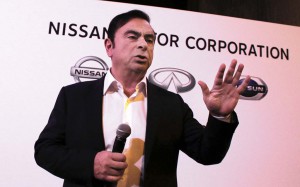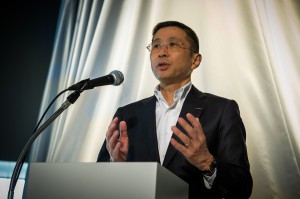
Carlos Ghosn remains Renault CEO — for now. Company officials appear to allowing the legal process to play out.
It took Carlos Ghosn two decades to transform three independent automakers into one of the world’s best-selling automotive alliances, but with the 64-year-old executive now sitting a Japanese jail, accused of a variety of financial misdeeds, that empire could come crashing down.
On Monday, Nissan broke its silence after completing a months-long investigation it said was “based on a whistleblower report.” Ghosn and another senior executive were arrested as they arrived in Japan from alliance partner Renault’s headquarters in France. The Brazilian-born Ghosn was accused of under-reporting his corporate income by as much as $45 million, while also misappropriating corporate funds.
“I feel strong anger and disappointment,” Ghosn’s handpicked successor as Nissan CEO Hiroto Saikawa told reporters at Nissan headquarters in Yokohama. “I am very sorry.”
The Nissan board was expected to meet and fire Ghosn, according to news reports out of Japan. Half-a-world away, officials at Renault were considering a similar move, though they might only temporarily remove the CEO from his post during the ongoing investigation launched by prosecutors in Tokyo.
(Carlos Ghosn fired by Nissan, reportedly arrested for misconduct. Click Here for the story.)
“Carlos Ghosn is no longer in a position where he is capable of leading Renault,” French Finance Minister Bruno Le Maire told France Info radio. But he added that the government “(has) not demanded the formal departure of Ghosn from the management board for a simple reason, which is that we do not have any proof and we follow due legal procedure.”
Like Sergio Marchionne, the late, jet-setting CEO of Fiat Chrysler Automobiles, Ghosn has been a busy man running a complicated automotive empire.
After nearly two years at Michelin, the exec was hired by Renault in 1996 and charged with coming up with a turnaround for the fast-sinking automaker. Within barely a year he had Renault back in the black. In turn, it stepped in to buy a controlling 38.6% stake in the even more troubled Nissan in 1999.
It was a deal that few expected to work, former General Motors Vice Chairman Bob Lutz going so far as to suggest, at the time, that Renault would be better off “taking $5 billion, putting it on a barge and sinking it in the middle of the ocean.”
Ghosn, the ever-ready fixer, was named chief operating officer and laid out an ambitious Nissan Revival Plan that, within three years had Nissan solidly in the black, its debt halved and its margins, at 4.5%, putting shame to many of its competitors.
It made him “a giant not only in the automotive industry, but on the global business stage as well,” said Michelle Krebs, an analyst with AutoTrader.
While the two companies operated as independent businesses, for practical purposes they have long been joined at the corporate hip.
They share most of their product platforms, as well as an extensive array of components. They work closely together on advanced research programs, including electrification and autonomous driving. And they are intertwined in global manufacturing and distribution. Since being pulled into the group, Mitsubishi has also begun comingling its operations.

French Finance Minister Bruno Le Maire said in a recent interview that Ghosn was no longer fit to run Renault.
Many of those activities were carefully crafted by Ghosn, especially the Alliance’s focus on the technology needed for future mobility, such as battery-electric vehicles like the Nissan Leaf.
“He was an asset in navigating globalized markets,” said Jeremy Acevedo, manager of data strategy for automotive service Edmunds. “So really this is coming at a terrible time.”
(Click Here for more about Ghosn’s views of a possible Renault takeover of the Alliance.)
And not just for Ghosn. Moody’s on Tuesday warned that while the storm could quickly blow over, if there surfaces “evidence of more lapses in controls, suggesting a systemic problem with broader financial, operational and reputational implications … the impact on Nissan’s credit quality would worsen.”
A credit hit could be just one of the many problems in the offing.
The Renault-Nissan empire added a third member last year after Nissan took a controlling stake in the failing Mitsubishi Motors. That move led Ghosn to relinquish the CEO role at Nissan to focus on turning around the smaller company.
Earlier this year, Ghosn laid out an ambitious forecast for what is now the Renault-Nissan-Mitsubishi Alliance, but it already showed its potential, nudging past Volkswagen to last year become the world’s largest automotive group by volume.
The question is whether the executive’s outsized ambitions are about to come to a screeching halt.
During a meeting with reporters in Tokyo on Tuesday, Mitsubishi CEO Osamu Masuko said the very alliance that Ghosn strung together is in jeopardy. “I don’t think there is anyone else on Earth like Ghosn who could run Renault, Nissan and Mitsubishi,” he said.
There were already some mounting frictions, in part led by Nissan CEO Saikawa’s desire for more autonomy, even as French government officials pressed Ghosn to stage a coup and completely take over the Japanese company for Renault.
Whomever replaces Ghosn will not only have to keep the alliance together but also work to avoid fracturing a separate partnership the now-tarnished chief had established with Daimler AG.
For the past nine years they have worked up an enviable list of joint projects. Engines made by Nissan in Smyrna, Tennessee, for example, are being used in Mercedes vehicles assembled in Alabama. Mercedes and Nissan’s Infiniti brand share a Mexican assembly plant. And a platform developed by Daimler underpins the Smart fortwo and Renault Twizzy. At a meeting with reporters in Paris last month, Ghosn and Daimler CEO Dieter Zetsche estimated they are each saving billions of dollars annually through their relationship and were looking for new opportunities.
But some observers have questioned whether the relationship might tumble. “Without the chemistry between us, maybe this wouldn’t have happened,” said Zetsche, who happens to be stepping down as CEO next year. Both he and Ghosn insisted the Daimler-Alliance relationship would outlast their reins, but the scandal enveloping the Alliance CEO could make that even more difficult.
There is the possibility, of course, that Japanese prosecutors will decide not to press charges or that Ghosn could prevail at trial – though Japan’s conviction rate is extraordinarily high. But, for now, all portions of the empire seem to be racing to see who can put more distance between them and the once-powerful executive.
(To see more about Renault, Alliance partners boosting investment in France, Click Here.)
“There will be blood because it is about preserving honor and trust with the public,” said Eric Schiffer, chairman of Los Angeles-based Reputation Management Consultants. “You’re witnessing the single greatest act of self-destruction in modern automotive history.”

